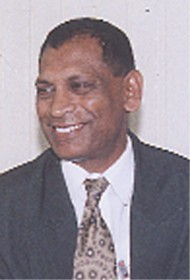–as GHARP 2 launched
Minister of Health Dr. Leslie Ramsammy says he will not allow international partners who join the national effort aimed at preventing HIV infections, to create parallel programmes that cannot be sustained when they pull out of the country because “he has seen it happen before and it is unacceptable”.

In a scorching address yesterday at the launch of Phase Two of the USAID/Guyana HIV/AIDS Reduction and Prevention Project (GHARP) Ramsammy said neither he nor any of the persons working on those programmes has the slightest idea how long they will last.
GHARP Two follows up on Phase One, which wrapped up in March this year, and is expected to last for another five years ending in 2015. USAID/GHARP is one of the US President’s Emergency Plan for AIDS Relief (PEPFAR) programmes which funds HIV/AIDS, tuberculosis and malaria programmes in many developing countries.
Ramsammy, citing “issues” he had with the first phase of GHARP, said there were persons who benefited from programmes during that phase who are today without services because the programmes were built as parallel ones and were not integrated into the national programme.
“…the Ministry of Health is scrambling to find a way to provide those services [which ended] and I will not permit it to happen in this second phase, I will absolutely not do so,” Ramsammy railed.
He continued that he will intervene and see that what happened in the past is not repeated.
“I will defend their [people’s] interest to the last breath. While I am a nice person, I am also a warrior and I work for the people. I don’t work for any organisation,” he thundered.
The minister said it is important that ground rules are upfront and clear. He emphasized that the national programme is run by the Ministry of Health and by the National AIDS Programme Secretariat (NAPS) and while there were partners there was simply one programme.
“… We have some partners with plenty money but that don’t make you any better,” Ramsammy said. “I hope I make myself quite clear. There are no elite groups working in our fight against HIV/AIDS. We are working together as a single team. We are all colleagues together, it is not us and them.”
Ramsammy said further that if he has any problems with anyone he will resort to calling the head of the partner programme and saying that he is not working with that particular person, adding that he expects that immediate action would be taken.
He reiterated that there is one national strategy in the country to prevent and reduce the impact of HIV, stressing that there is one coordinating body.
US Embassy Charge d’Affaires Karen Williams also spoke at the launch. She noted that the US government has expended some US$18 billion in HIV funding for developing countries around the world. She said too that the commitment was recently renewed and a further US$48 billion was set aside to continue the programmes.
Williams pointed out that Guyana is one of two countries in the Caribbean/Latin American region receiving the funding. She noted that the second phase of the GHARP project will build on USAID support for Guyana’s national response to HIV/AIDS and continued assistance to the areas of adult care and support, counselling and testing, prevention of mother to child transmission (PMTCT) and orphans and vulnerable children.
NAPS Head Dr Shanti Singh said the national programme today reports a consistently reducing ante-natal prevalence and a reduction in HIV rates among some of the most at-risk populations.
But she noted that there is still a volume of work to be done while stressing that now is not the time for complacency. She added that the new partnership comes at a time when Guyana is analyzing the efforts made in the local fight through a mid-term review of the third national strategic plan on HIV/AIDS.
Newly installed Chief of Party of USAID/GHARP Silvia Gurrola Bonilla briefly stated yesterday that she is keen on working with the government and its partners. She said the second phase hopes to build key alliances and strategic partnerships and support the mainstreaming of HIV related activities into the line ministry.
GHARP Two is being supported by three overseas partners: Management Sciences for Health (MSH), AIDS Healthcare Foundation and Howard Delafield International (HDI). GHARP was started in 2004.





